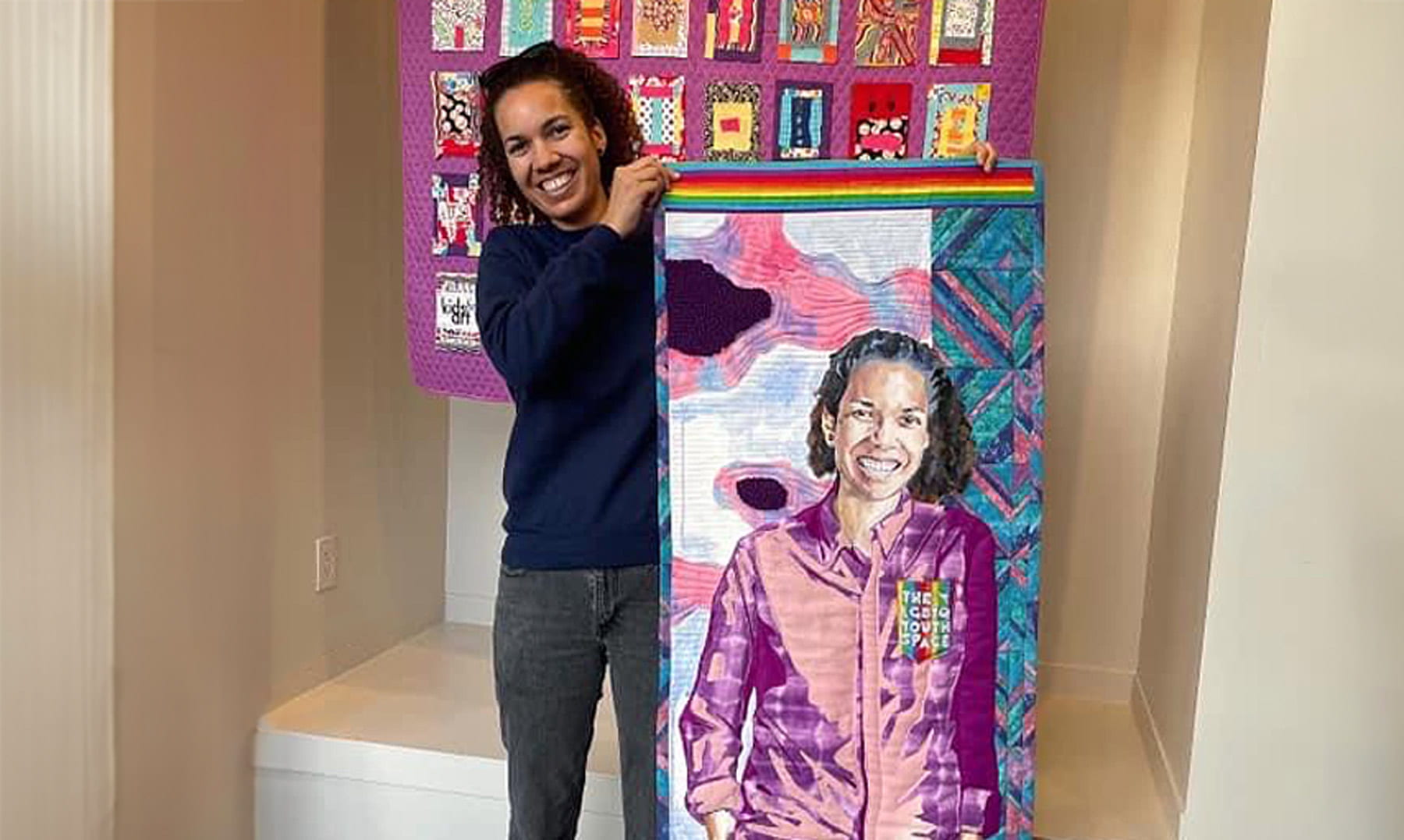Alumna Adrienne Keel Shares Moments of Pride

Alumna Adrienne Keel stands with a portrait created for the Womanhood Project by fabric artist Isabelle King. Photo courtesy of Adrienne Keel.
On June 28, 1970, New York City hosted the first Pride March a year to the day after the Stonewall Uprising, a series of events between LGBTQ+ protesters and the police that transpired over six days, culminating in a police raid on the Stonewall Inn, a gay bar. The uprising is widely credited as kickstarting an organized national movement for LGBTQIA+ rights, which now includes celebrations, parades, performances and demonstrations held every June.
During the Civil Rights Movement, San José State cultivated a growing movement for LGBTQ+ rights. There have been many pioneering Spartans who have advocated for inclusivity and resources for members of the LGBTQIA+ community. This June, we recognize community leader Adrienne Keel, ’10 Psychology, who serves as the director of LGBTQ+ programs at Caminar, a behavioral services agency in San José. She agreed to answer questions about her time at SJSU, as well as to share resources that support LGBTQ+ folks in Silicon Valley.
Tell me about your experience with the LGBTQ+ community as a young person. Why was it important for you to find or cultivate?
Adrienne Keel (AK): I spent a lot of time hanging out at the youth program at the Billy DeFrank Center during my senior year of high school, and when I transferred to SJSU from Evergreen Valley College, I joined Queers Thoughtfully Interrupting Prejudice (QTIP), a student club. My time at SJSU predated the Pride Center, but if it had been there while I was a student, that is probably where you would have found me between classes. In my teens and young adulthood, I intentionally sought out queer spaces to connect with others and build community because, at the time, it was in these environments that I felt safest and most able to exist authentically.
Tell me about your work with the LGBTQ+ youth spaces in Silicon Valley. What drew you to this work, and what makes it rewarding?
AK: I serve as the director of LGBTQ programs for a behavioral health agency called Caminar. In August, I will celebrate twelve years on our team! My experiences as a young person directly informed my career path. My mantra, which is a guiding star whenever spending time with our youth, is “Be the adult you needed.” I often wonder what my experiences would have been like if I had older queer mentors (especially queer Black women) growing up. The most rewarding part of this work is the chance to be that safe and supportive adult for the next generation(s).
What resources are available for LGTBQ+ youth and young adults in San Jose and Silicon Valley?
AK: Fortunately, the resources available for local youth and young adults are only growing! The LGBTQ Youth Space, Outlet, The Bill Wilson Center, Q-Corner, The Gender Health Center, and beyond are doing wonderful work to ensure young trans and queer folks feel safe, seen and connected to vital resources. It’s worth mentioning that over the course of my time with our programs, I have also seen an increase in amazing school staff and public librarians working to create safe spaces throughout our community. That’s the dream; affirming environments don’t need to be exclusive to a few LGBTQ-specific providers.
Tell us about the Qmunity district in San José. Why is it important?
AK: San José is one of the largest cities in the nation, so I always wondered why we didn’t have a queer district or neighborhood. The Qmunity District is a visual representation of our existence and resilience in a world that often still tries to deny our humanity.
Tell us about the recognition you’ve received from Santa Clara County. How did it feel to receive these awards?
AK: In 2018, I was awarded the County of Santa Clara Behavioral Health Mover and Shaker Community Hero Award, and in 2021, I received the Community Hero Award from the County of Santa Clara Commission on the Status of Women. Not only were these recognitions a tremendous honor, but they also continue to hold me accountable to doing my very best work. If my peers deem me an exemplary leader, I’d better live up to that!
How can allies actively support and advocate for their LGTBQ+ neighbors and friends?
AK: Continue to advocate for queer and trans folks even when we are not in the room. Always respect the name and pronouns a person gives you, unless you were told otherwise for safety reasons. Language is ever-evolving (and that is a good thing!), so remain open to that evolution. If a person comes out to you, please keep their identity to yourself, unless you were given explicit consent to share it with others. Please remember that we are not a monolith. What is true for one of us may not be true for others. Own your mistakes and commit to improving. A simple, “I messed up, I will do better,” can go a long way.
What main message would you like to share with the SJSU community?
AK: Based on my experiences during SJSU, I would encourage students to get involved in campus groups/clubs/organizations which center things that are meaningful to them. You never know what kind of connections you’ll make when you find your community. Two of my closest and longest friendships were forged during my days in QTIP. I mean, these people are like siblings to me! It’s wild to think that if I had never put myself out there, we would have never met.




